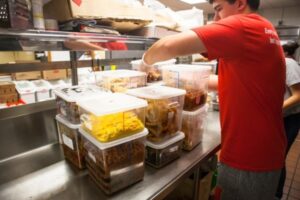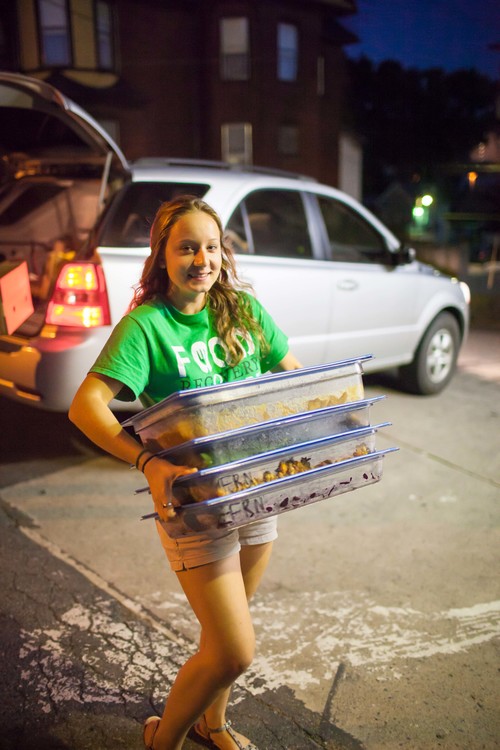These College Students Really Hate Food Waste

College students around the U.S. can’t stomach the idea that while 1 in 6 Americans don’t know where their next meal will come from, Americans waste 40 percent of their food.
The inconsistency drove many to join or start campus chapters of the Food Recovery Network – a nonprofit that collects uneaten prepared food from dining services and restaurants and delivers it to nonprofits fighting hunger in the community, including soup kitchens and homeless shelters.
“Our chapter is the first for the state of New Mexico,” Lori Derr, President and Founder of FRN at New Mexico State University, wrote in an email. “I find that unbelievable because the poverty rate is so high here. What made me want to get involved is my professor showed our class a video about FRN and it seemed like such a simple solution to a major problem. Nobody should have to go to bed hungry when so much food is being wasted.”
Adam Charnin-Aker, founder and president of Dartmouth Feeding Neighbors, the FRN chapter at Dartmouth College, said in an email that students’ eyes are opened to the “harsh realities” experienced by many families in the community surrounding their campus.
“The fact that members of our local community were struggling to pay utility bills and also provide food for their families while we have a superfluous amount of food on campus forced me to take action. Recovering unused food from our dining halls is a simple solution to help repress food insecurity problems in towns surrounding Dartmouth,” he said.
Since it started in 2011, FRN has grown to include more than 160 campuses across 39 states, and national organizers say it will grow to 180 campuses by the end of this academic year. Their work and growth is paying off: They rescued their 1 millionth pound of food this month.
Hitting such a milestone after only four years has fired up national and campus organizers, like Sara Gassman, director of member support and communications at FRN’s headquarters in College Park, Maryland.
“It felt like motivation to work toward the next million pounds of food,” she said.

Chapters on each campus form relationships with their dining services, many of which are operated by national companies like Sodexo and Aramark. Gassman said FRN has strong relationships on a national level with those companies as well. Many dining managers have thought about food rescue but don’t have the means or capacity to set up their own program, she said. So they’re open to students who want to do it for them.
Some groups recover food every day, while others schedule volunteers a few days a week. At Willamette University in Salem, Oregon, a couple of volunteers pick up boxes of leftover food every evening, then drive it to one of two homeless shelters they work with. On Sundays, volunteers use a bike trailer to haul food instead of a car to “amp up sustainability a bit,” Iris Dowd, FRN co-president at Willamette wrote in an email.
“It only takes half an hour each night,” Dowd said. “It has not been that hard to find volunteers because a lot of people care about both reducing waste and feeding hungry people.”
Food waste made headlines in September when the U.S. Department of Agriculture announced its desire to cut food waste in half by 2030. Officials said reducing food waste by just 15 percent would feed 25 million Americans each year. Instead, Americans waste an estimated 133 billion pounds of food annually. That food ends up in landfills, which are the third largest source of methane. So, reducing food waste could make a dent in both hunger and climate change.
FRN is on its way to making an impact on food waste – and not just with numbers, though those are impressive. Last year, students recovered more food in two semesters than they did in the previous three years, Gassman said. Beyond pounds of food, college students become aware that hunger and waste exist in the same society. That awareness could change the world.
“We’re building a generation of student leaders empowered to make change not just on food system issues but also on poverty issues,” she said. “These sorts of mindsets – that anything is possible – are going to carry through the rest of their lives.”
Related on Organic Authority
France May Have Found That Fighting Food Waste Comes Down to One Surprising Secret
This Community Fridge Prevents Food Waste and Feeds Those in Need
Give Thanks for Bounty and Reduce Food Waste From Your Thanksgiving Celebration
Photos by James Souder via Food Recovery Network

